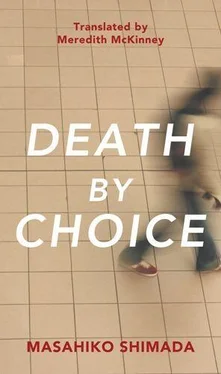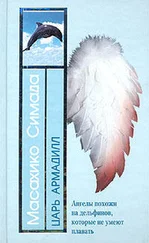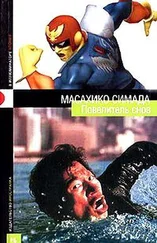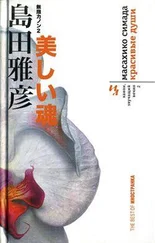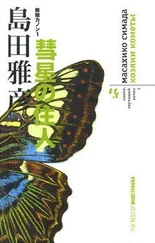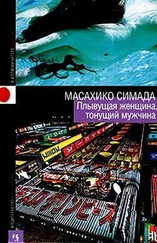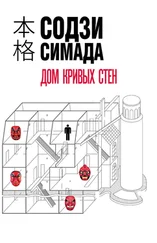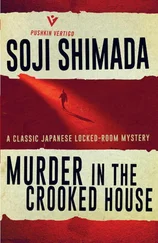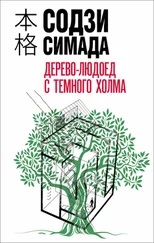“I wonder how the guy felt. Maybe he felt all tingly when the birds were eating him.”
“Well he’d be dead, so he wouldn’t feel anything. But I wouldn’t like a sky burial myself.”
Kita looked at the doctor in surprise. “You got some special reason why you don’t like the idea? I had you down for the type of guy who didn’t care what happened after death,” he said.
“I just don’t like birds,” the doctor replied shortly.
“There’s that northern fox here in Hokkaido, isn’t there? I wonder if we could manage a fox burial. Would they eat me, do you think?”
“I doubt it.”
“How about I give it a try? Whatever happens, you’ll cut me up to take out the organs, won’t you? So how about dismembering my remains then like they do in sky burials so foxes can eat the rest?”
The doctor coldly rejected this proposal. “I’m not a funeral director or a butcher, you know. I’m a doctor.”
The guy dug in his heels over the oddest things. And here he was, harming his medical profession by turning killer and treating human life in this high-handed fashion, and he turns out to be afraid of birds!
“I’ll bet your father would’ve liked a sky burial, you know,” Kita remarked jokingly.
“Hmm, yes,” the doctor said, nodding thoughtfully. “He would have made a wonderfully nutritious corpse,” he added quietly.
Don’t Tickle My Corpse
Five in the morning. A sense of the sea somewhere nearby. There was light all around by now, but the sky was like poured concrete.
Kita pulled the car over to the side of the road and got out, leaving the engine running. Outside, the air was cold and grass-scented. Before him stretched a gently undulating plain. If he couldn’t get himself eaten by vultures or foxes, at least he might be able to disintegrate into particles in the wide-open spaces someplace like this, and turn to fertilizer. A spare and simple burial of this sort would suit him perfectly, thought Kita.
The doctor had laid back his seat and was sound asleep. Kita set off into the plain, making his way among the tufts of tall grasses and plants he’d never seen before. The muddy red earth stuck to the soles of his sneakers as he walked along in search of a flat rock to lay himself down on. The chill morning air enveloped him. Suddenly seized with a need to piss, he found a suitable place and relieved himself. I’ll do this maybe twice more before I die, he thought. And I’d better make sure there’s nothing left inside me to emerge when I do die. Also, I’d really like to take a bath. And get some new clothes. And a haircut.
Behind him he heard the sound of someone pushing through the grass. He turned to see the doctor making his way towards him, out of breath. As always, his face was expressionless, but the exhaustion of the last few days showed in the stubble on his chin and in his sunken eyes.
“I wasn’t trying to escape,” Kita explained.
The doctor stared resentfully at him, breathing hard. He held a handful of plants in each hand. There were no flowers, and each limp, drooping leaf had five fingers, like a baby’s hands. “I’d heard about this growing here, but I never really believed it,” he said proudly.
“What is it?” Kita asked.
“Marijuana,” the doctor replied.
“You know about plants too, eh?” Kita said casually, turning away.
“It relaxes you, see. You need to relax before the big event,” the doctor said, like a sports coach. Kita felt a bit like an athlete before an important race.
They went back to the car, and the doctor laid the freshly picked marijuana on the hot hood. He launched into another unasked-for sermon.
“You dry it like this, then roll it into a cigarette to smoke it. That way you’ll die happy.”
“Is there a town nearby? I feel like a change of mood. There’s still a little time before the event.”
“There’s one about ten miles on from here I think.”
“Where are we?”
“I’d say we’re somewhere in the Yufutsu Plain.”
The sound of this name brought it home to Kita that there was no going back to Tokyo. He shouldn’t feel any more attachment to the place. There was no need to walk those familiar streets or climb those steep hills ever again. He’d never be back there in the crowds flowing past Shibuya Station or through the Shinjuku underground passages.
“The town will still be asleep, so we should take a bit of a rest too.” The doctor yawned, and with the fresh outdoor air in his lungs, immediately went back to sleep. Kita followed his lead, but once his eyes closed images from the past few days began to flit through his head. The face of Shinobu reading the Bible, and of Mizuho, whose days were spent with the phantom of her dead child, wafted through his brain like drifting smoke. His mother, whose mind had slipped back twenty years into the past, rose like steam before his eyes. And then he shifted into reminiscence mode.
“So I’m going to be leaving Mum and Mizuho and Shinobu behind,” he thought, and instantly his pulse quickened, and he opened his eyes. To shake himself out of it, he turned on the car radio. Good grief, there was a voice just like Yashiro’s, giving some Buddhist sermon! He hastily turned it off again.
Unable to stand this feeling of limbo any longer, Kita got out and collected the dried marijuana, got back in, slipped the car into Drive, and took off. This time, the doctor was soundly asleep.
At the first sign of human life in three hours, Kita came to a halt and asked through the window where he was. But there was no response. The old lady kept her mouth clamped firmly shut. Was there a hotel nearby? he asked. Still she remained silent, and only stared at him cross-eyed.
Giving up, he nodded to her and took off again.
In another fifteen minutes, he could feel he was very close to the sea. He turned off onto a side road, and drove along until the sea suddenly spread before his eyes. Realizing that he was almost out of gas, he turned off the engine. There was a lone farmhouse not far away.
“You want something there?” The doctor’s sleep had been interrupted for the third time.
“I’ll just go check it out,” Kita said, getting out. He was sure at least that the little tiled house wasn’t empty. There was a small farm truck parked in the garden, and a crouching dog warned him off with glowering eyes. He wasn’t much of a guard dog, though. Perhaps he was the shy, retiring kind, for he merely gave a couple of low barks.
One of the aluminium-frame windows slid open a little, and someone peered out. Before Kita could say “Good morning” the window slammed shut again, and there was the sound of running feet inside. Kita waited. Next, the window opened rather wider, and a middle-aged woman’s voice said, “What do you want, so early in the morning?”
“I’m gathering material for a radio show,” Kita replied.
There was a short pause. Then, “Who might you be?” the voice asked.
“My name is Kita. From the Tokyo radio station. I just managed to make it here on time.” He wasn’t thinking at all, but he sounded quite convincing. He knew he’d be asked what sort of material he was after. “That’s funny,” he muttered, looking at the name by the door. “This is the home of the Kikuis, isn’t it? I had an arrangement to come along early this morning for a personal interview.”
The door opened, and a middle-aged woman in an apron appeared. A girl in her mid-teens stared curiously out at Kita from behind her.
“Is your husband here?” Kita asked.
“He’s gone to Sapporo.”
“Oh dear, so I’ve missed him. That’s a shame. He must have forgotten. You didn’t know? We’d fixed it for me and a Tokyo doctor to come here and spend the day with you to see how you lived, for our program.”
Читать дальше
